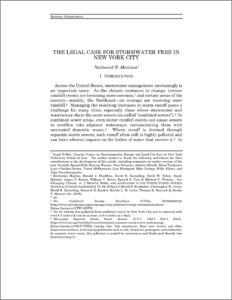Many cities in the United States have turned to stormwater fees to help address the infrastructure challenges posed by stormwater runoff, which continue to mount due to climate change. Stormwater fees help mitigate the strain caused by excess runoff amounts both by allowing municipalities to raise funds needed to improve sewer systems’ performance and by encouraging the adoption of green infrastructure measures that can detain and diffuse rainfall before it enters municipal drainage networks. New York City, however, has been an exception to the national trend towards stormwater fee adoption, with some questioning whether either the City’s Department of Environmental Protection or the New York City Water Board has the legal authority necessary to institute a stormwater fee program without enabling legislation by the New York State Legislature.
This paper demonstrates that, notwithstanding the lack of explicit authorization by the Legislature, the New York City Water Board has ample authority under existing law to institute a stormwater fee today. In the alternative, the Department of Environmental Protection may create a stand-alone stormwater fee program, although such an initiative likely would require new legislation by the City Council to go forward. With time of the essence to better prepare New York City for the impacts of climate change, the New York City Water Board and the Department of Environmental Protection should begin planning for a stormwater fee in New York City as soon as possible.
Published in Albany Law Review, Vol. 86, Issue 4
This work was made possible by the generous support of the Ida and Robert Gordon Family Foundation.

